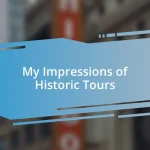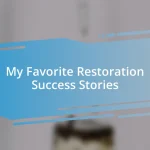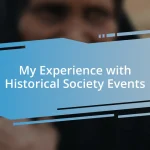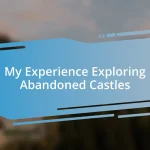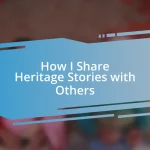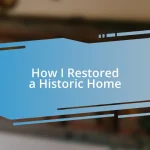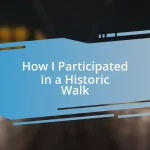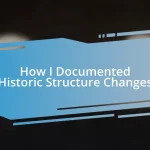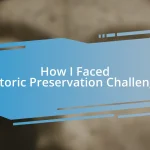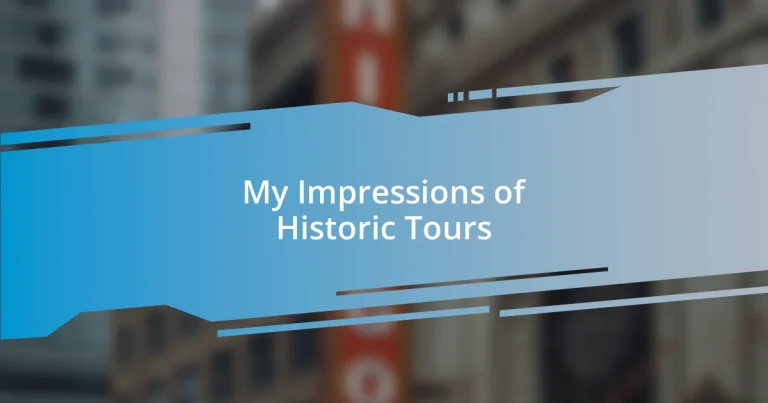Key takeaways:
- Historic tours serve as immersive narratives that connect personal experiences with broader historical contexts, deepening one’s understanding of the past.
- Choosing the right tour, characterized by knowledgeable guides and suitable themes, enhances the overall experience and fosters personal discovery.
- Capturing and sharing memories through journaling and conversations strengthens emotional connections to history and builds camaraderie among participants.
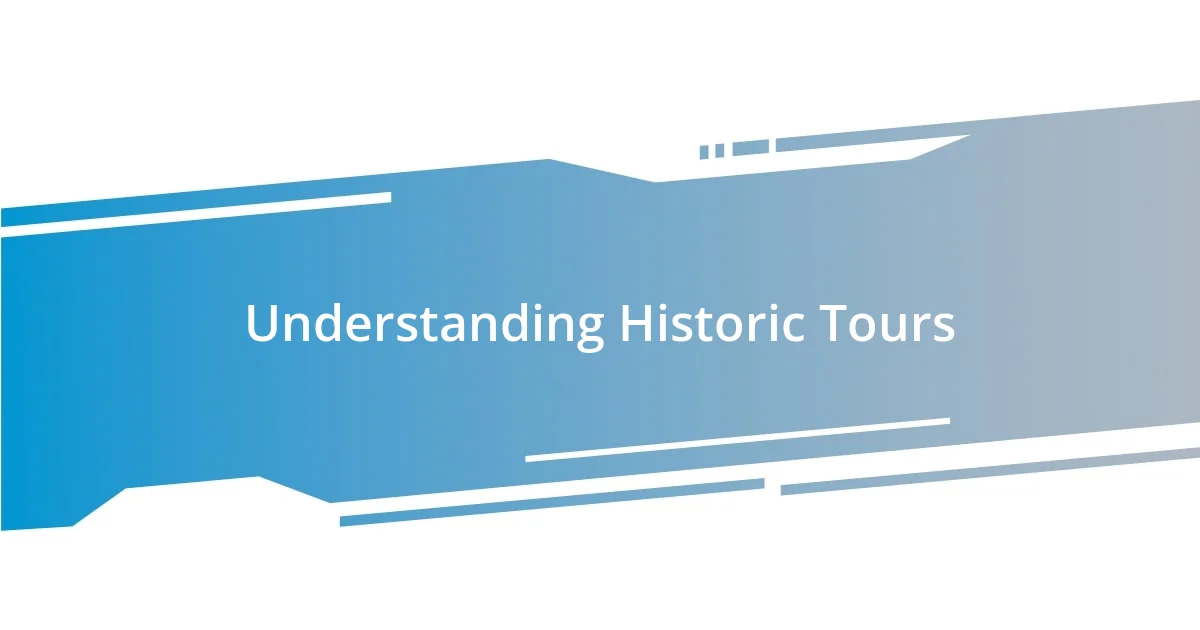
Understanding Historic Tours
Historic tours offer a unique peek into the past, weaving together stories, architecture, and culture that often stir something deep within us. I remember standing in front of an ancient castle and feeling the weight of history as I imagined the lives of those who walked its halls centuries ago. Isn’t it fascinating how a single tour can transform our perspective on events we thought we knew about?
Understanding historic tours requires recognizing their role as living narratives. Each landmark has a tale to tell, and I’ve found that the best guides can bring these stories to life in a way that feels personal. Have you ever listened to a guide who made you feel like you were part of the history? That connection leaves a lasting impression, reminding me that history isn’t just about dates and facts; it’s about the people who shaped our world.
Moreover, the impact of a historic tour can extend beyond the tour itself. Engaging with history can evoke emotions like nostalgia, curiosity, or even pride, stirring a desire to learn more. After attending a tour in my hometown, I felt compelled to dig deeper into my local history, seeking out books and resources that enriched my understanding. Isn’t it remarkable how a simple tour can ignite a lifelong passion for history?
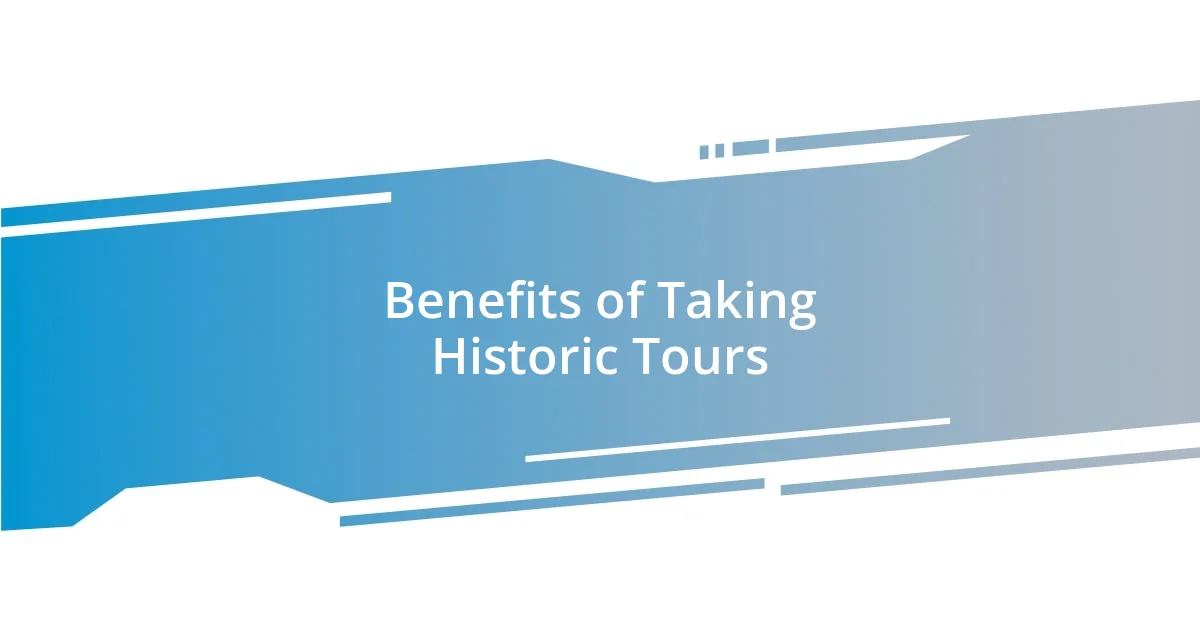
Benefits of Taking Historic Tours
Experiencing a historic tour can fundamentally enrich our understanding of a place. I recall wandering through the streets of a colonial town, where every cobblestone seemed to whisper tales of the past. The alignment of history and place has a way of anchoring you, bringing the stories to life in a visceral way that textbooks simply can’t replicate. Sometimes, I find that hearing about events in the very areas they happened fosters a sense of connection I hadn’t expected.
Historic tours also offer an opportunity for personal discovery. During one particular tour, I discovered that my ancestors had walked the same paths in the city I now call home. Surprisingly, this connection inspired me to research my family tree, leading to fascinating stories of resilience and adventure. How often do we stumble upon such personal links through guided exploration? It’s like finding a piece of ourselves in the tapestry of history.
Beyond knowledge and personal connections, there’s a social aspect to historic tours that shouldn’t be overlooked. Engaging with fellow participants can spark conversations that change perspectives. I remember discussing the implications of a historical event with a stranger on a tour; it was eye-opening, and I left with not just facts but new insights. Isn’t it remarkable how learning in a communal setting can foster deeper understanding and camaraderie?
| Benefit | Description |
|---|---|
| Enhanced Understanding | Historic tours provide a tangible connection to events and places, deepening our comprehension of history. |
| Personal Discovery | These tours can reveal personal connections to history, inspiring research and a greater sense of identity. |
| Social Engagement | Interacting with fellow participants can lead to enriching discussions and a broader perspective. |
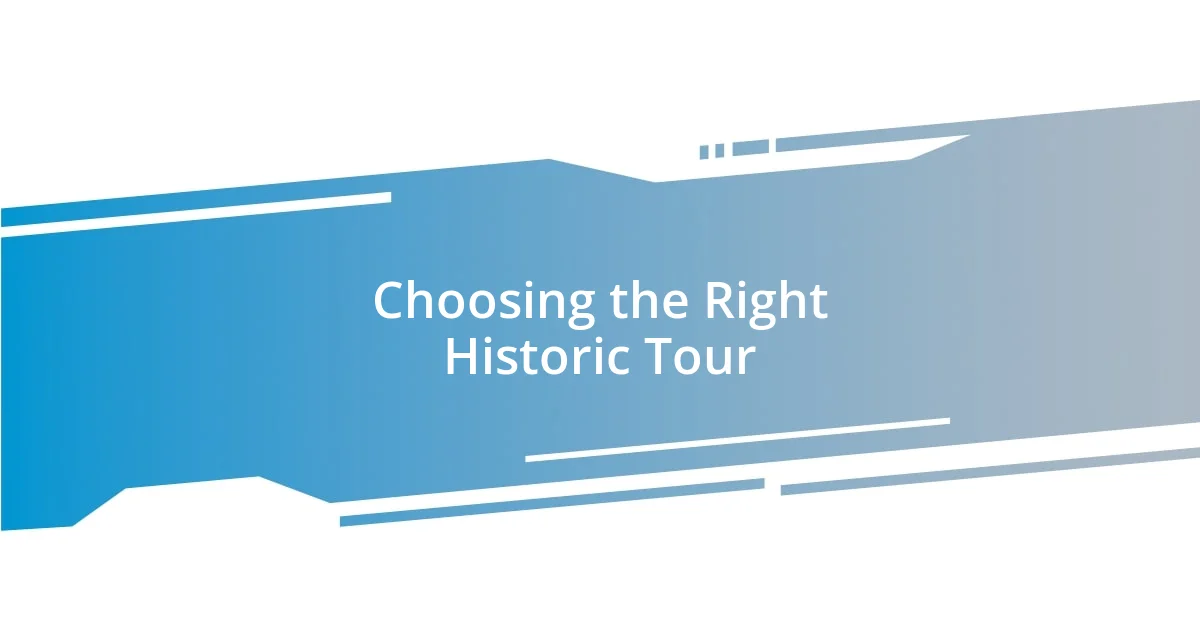
Choosing the Right Historic Tour
Choosing the right historic tour can significantly enhance your experience, making all the difference between a mundane trip and an unforgettable journey through time. I once went on a tour that may have sounded ordinary at first, but the guide turned out to be a passionate historian. His ability to weave dramatic stories around each location made me feel as if I was walking alongside history itself. It’s crucial to find a tour that resonates with you, whether that’s through the guide’s storytelling, the specific historical focus, or even the pace of the tour.
When selecting a historic tour, consider these aspects:
-
Focus and Theme: Do you prefer military history, cultural explorations, or architecture? Choosing a tour that aligns with your interests will make the experience more meaningful to you.
-
Guide Qualifications: Look for tours led by knowledgeable guides. Their enthusiasm and expertise can transform your understanding of the historical context.
-
Group Size: Smaller groups often allow for more personal interactions and deeper discussions. I’ve found that in more intimate settings, I could ask questions freely and engage more deeply with the content.
-
Reviews and Recommendations: Check online reviews or ask friends for recommendations to find tours that others found impactful. I trust word-of-mouth suggestions; they often lead me to hidden gems.
-
Accessibility and Comfort: Ensure the tour is suitable for your physical capabilities. A tour that prioritizes your comfort will let you focus on absorbing the experience rather than worrying about logistics.
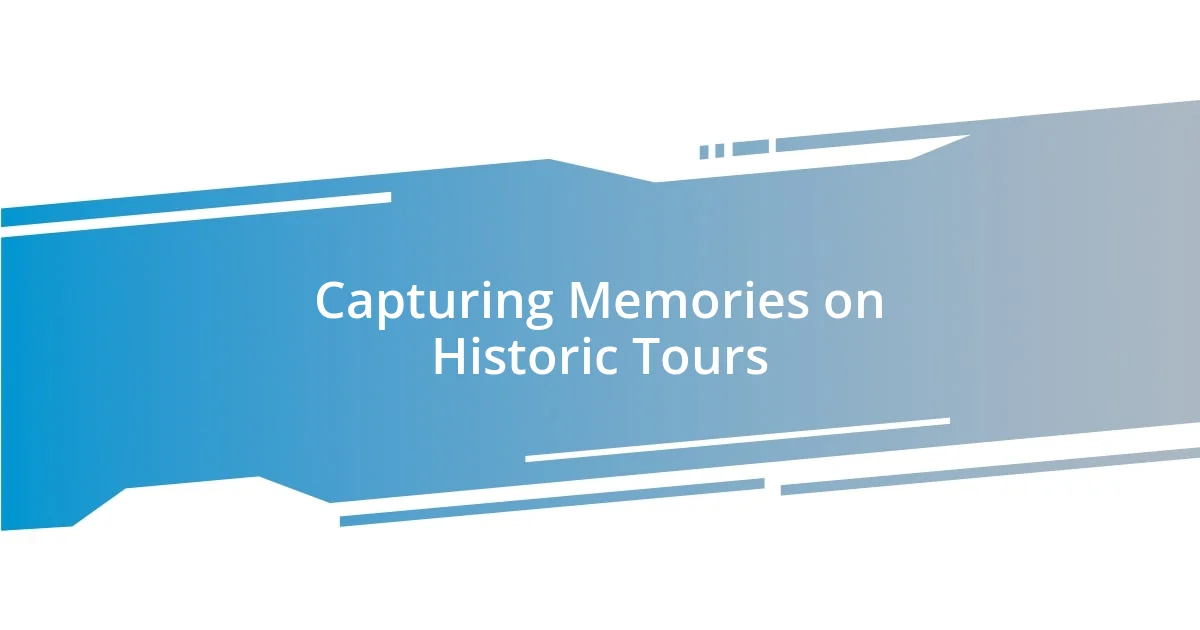
Capturing Memories on Historic Tours
Capturing memories on historic tours is an art form that can transform your experience into something deeply personal. I remember standing in an ancient castle, the wind rustling through the trees, as I snapped a photo. It felt as if I was capturing not just a moment but the echoes of voices from centuries past. Have you ever felt that rush when a photograph resonates with a story you’ve just learned? It’s like freezing a piece of history in time.
As I explored a historic battlefield, I took a moment to reflect and record my thoughts in a journal. Writing about the details—like the way the sunlight danced on the grassy knolls—helped me process the emotions surrounding the sacrifices made in that very spot. I often encourage friends to carry a notebook during tours; it’s fascinating how the simple act of jotting down reflections can deepen your connection to the experience. How often do we pull our memories closer just by putting pen to paper?
Sharing these memories has become just as important as capturing them. After a wonderfully insightful tour, I organized a small gathering with friends to relive the experience. We shared our favorite moments, exchanged photos, and even planned our next adventure together. I realized then how these tours bond us—not just to history, but to each other, creating a shared narrative that we can cherish for years to come. Isn’t it wonderful how history can inspire such meaningful connections?
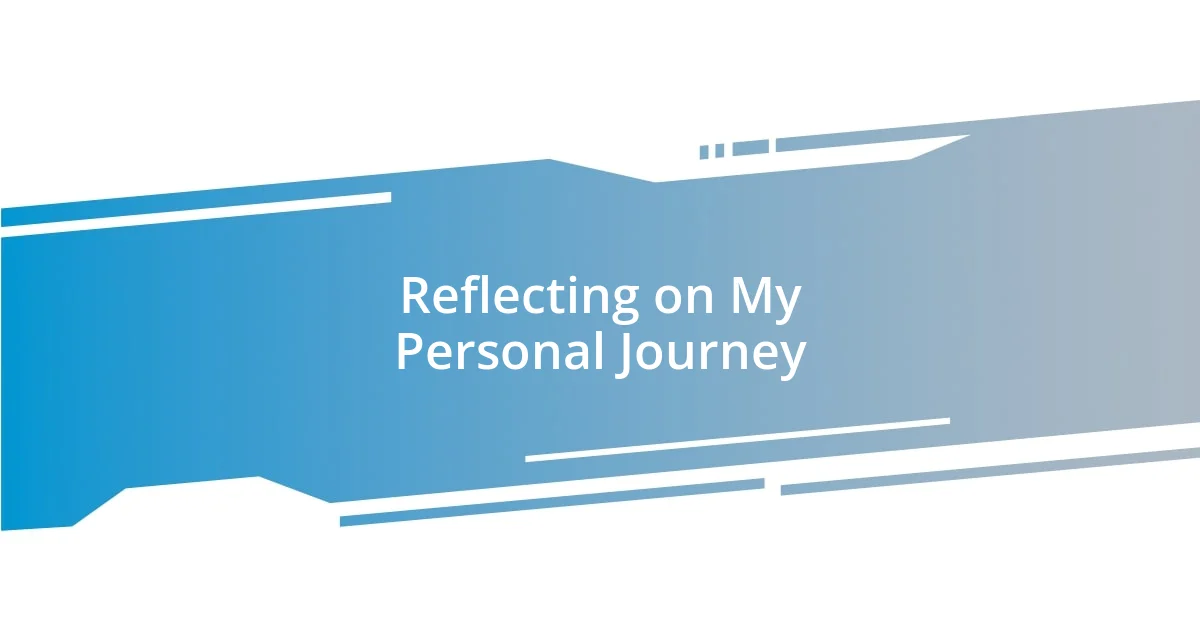
Reflecting on My Personal Journey
Reflecting on my personal journey through historic tours has been nothing short of transformative. There was one particular tour that took us through the narrow streets of an ancient city, where I stumbled upon a quaint little shop selling replicas of historical artifacts. As I held an intricately designed compass, I felt a surge of connection to explorers who boldly navigated uncharted waters centuries ago. Have you ever held an object that suddenly bridges a gap between past and present? For me, that moment was powerful.
I often think back to my visit to a historic plantation where I learned about the complex layers of its history. It wasn’t just about the architecture; it was about understanding the lives intertwined within its walls. Listening to stories from a guide who had familial ties to the land brought a palpable energy to the tour. It ignited an emotional response in me, sparking a desire to delve deeper into the narratives often overlooked in textbooks. How often do we encounter such moments that challenge our previously held beliefs about history? This realization makes me appreciate the nuanced and sometimes uncomfortable stories behind the places we visit.
Each tour I embark on contributes to my evolving understanding of history. I recall sitting on the steps of a war memorial, feeling the weight of sacrifice while surrounded by others engaged in quiet reflection. In that moment, I understood that historic tours are not just about observing; they’re about experiencing, questioning, and connecting. These journeys encourage me to keep asking—what stories remain untold? What lessons can we learn from the past that shape our future? Engaging with these questions has become a treasured part of my travel experience.

